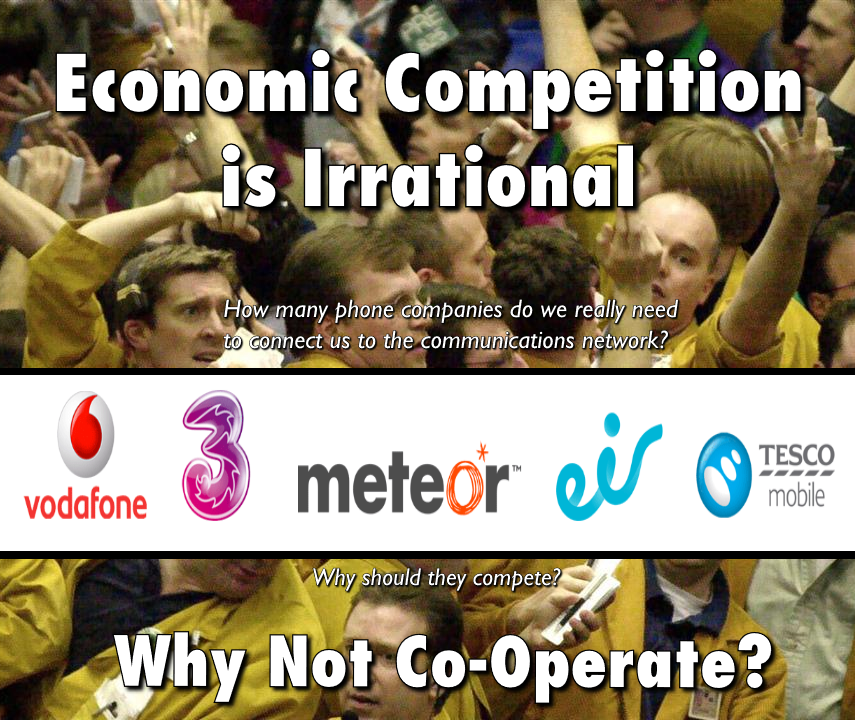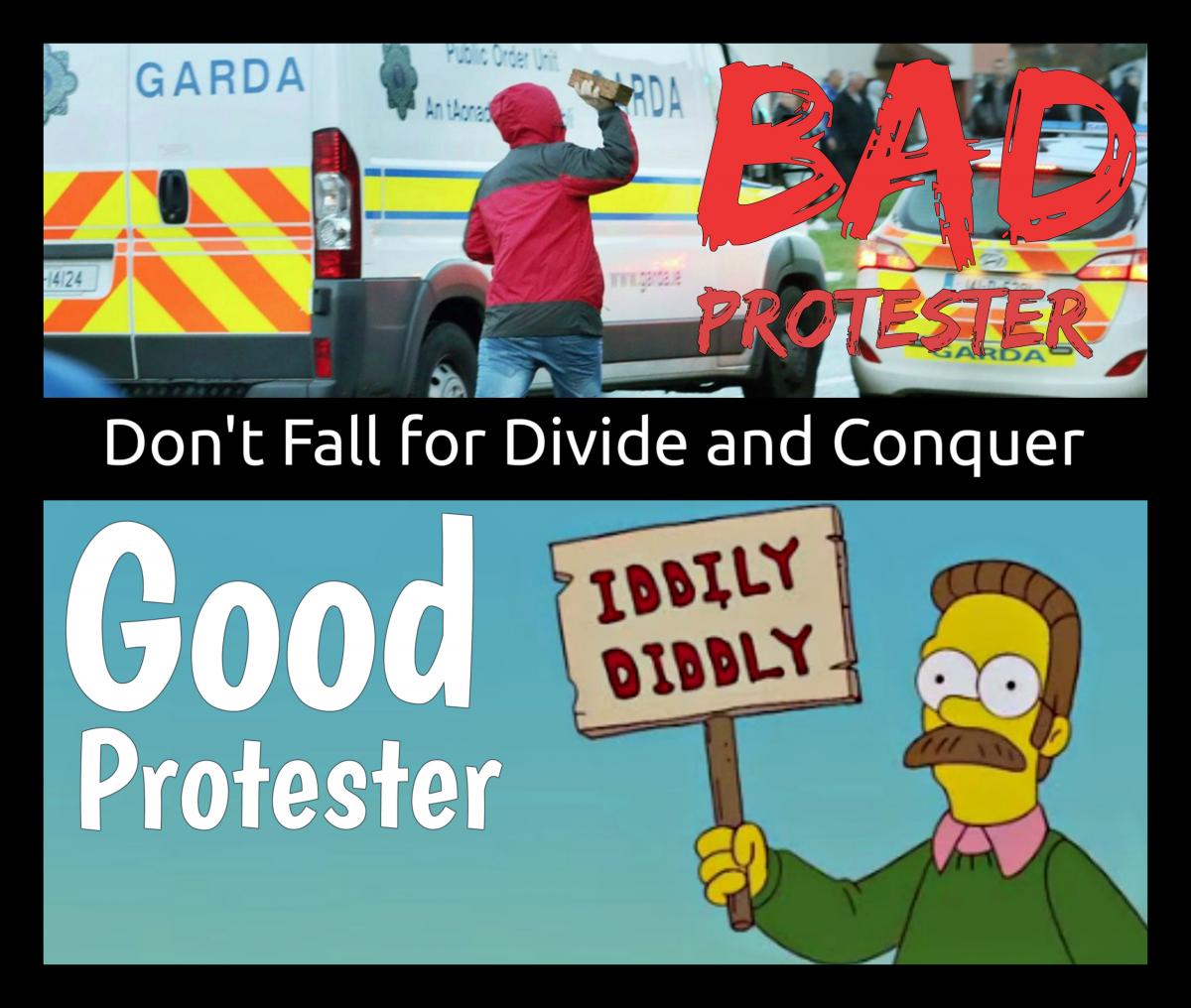Over 30 years of anarchist writing from Ireland listed under hundreds of topics
Audio
How my politics is intersectional - audio from panel at 2018 #DABF
Panel from the 2018 Dublin Anarchist bookfair on the intersection between race politics, class and gender in Ireland with a particular focus on the current housing struggles and the Together for Yes referendum campaign / Repeal movement. [audio]
Thinking About Anarchism: Competition Versus Co-operation
Consider the accompanying image: phone service providers.  How many of these companies does a rational society really need? Their job is to connect our mobile phones to communications networks (GSM, 3G, 4G, Wi-Fi). Do we really need five such organisations in the 26 counties to attempt that same task? And who does it benefit that these five organisations compete with one another for profit? After all, they are all using the same infrastructure! Surely five organisations co-operating will be more effective than five walled-off organisations each attempting the same task individually.
How many of these companies does a rational society really need? Their job is to connect our mobile phones to communications networks (GSM, 3G, 4G, Wi-Fi). Do we really need five such organisations in the 26 counties to attempt that same task? And who does it benefit that these five organisations compete with one another for profit? After all, they are all using the same infrastructure! Surely five organisations co-operating will be more effective than five walled-off organisations each attempting the same task individually.
But this article is not about phone coverage in particular. It is about those broader questions which run right through the fabric of our societies.
Thinking About Anarchism: Hierarchy - What it is and isn't
Wondering why your vote doesn’t seem to make a difference, why your wages seem to barely cover your costs, or why you feel like a second-class citizen? Then, you’re thinking about hierarchy.
 Anarchists treat ‘hierarchy’ as the central issue in society, as the unifying theme in most of the problems we face. Then, the aim is to get rid of hierarchy and replace it with something better. But what is hierarchy? It’s not something which is talked about in mainstream political discourse, and even anarchists themselves can sometimes misunderstand it.
Anarchists treat ‘hierarchy’ as the central issue in society, as the unifying theme in most of the problems we face. Then, the aim is to get rid of hierarchy and replace it with something better. But what is hierarchy? It’s not something which is talked about in mainstream political discourse, and even anarchists themselves can sometimes misunderstand it.
Climate Change Denial Myths: The Truth
Climate change is a hoax! Or so some say. There is much debate over whether anthropogenic climate change is real. Many assertions have been made from a variety of sources which claim that humans cannot affect the climate. However, this debate is one for the cameras, because almost all working climate scientists agree that these claims are inaccurate and that humans are almost certainly responsible for the changing weather patterns we have been witnessing in recent years.
A recent article gave a basic overview of climate change. This article will explore some of the most common assertions made by anthropogenic climate-change deniers and then contrast these claims with the findings of climate scientists. I will then briefly look at some cases of how climate scientists have been slandered in order to try to discredit their findings, and finally some of the potential motivations behind these slanders will be examined. Any curious readers are invited to please click on the links below if they wish to familiarise themselves with the sources and some of the specific scientific studies relevant to this article's content.
A critical history of WSM from a 2010 internal meeting
This audio history of the WSM was presented at a meeting in Cork in 2010 as part of a day of critical internal discussions. As it was originally recorded for internal use it's been edited so it is just the presenter and then his responses to questions and discussion points. For more on the history of the Workers Solidarity Movement see https://www.wsm.ie/wsm-history
Audio - Anti-fascism in the age of Trump: A panel of US anarchists speak in Dublin
Nazis, white-supremacists, “Identitarians”, and other fascists are organising, becoming more emboldened to attack members of our communities and spread hate speech online, in the media and on our streets. In the US, the election of Donald Trump has been heralded as a victory by right-wing reactionaries and racists around the world. [Audio]
Good Protester, Bad Protester - Don't Fall for Divide & Conquer (Text & Audio)
 I'm not a bad protester, I promise. I'm a good protester. I'll be a good protester!
I'm not a bad protester, I promise. I'm a good protester. I'll be a good protester!
The farce that is the Jobstown [1] trial has mostly been a back and forth about what kind of protest is acceptable and right. Did the people of Jobstown keep Joan Burton and her assistant waiting for too long? Were they too foul mouthed? Too angry? Did they bang on the car too much? What about kids throwing water balloons? The infamous Jobstown brick? Maybe we should put them in prison then. At the heart of this argument is a very important notion: splitting people into 'Good Protesters' and 'Bad Protesters'. This article lays out exactly how that works, and how we should counter this divide and conquer tactic.
After the coup - a visit to Istanbul & north Kurdistan - interview with activist researcher
Farah recently visited Istanbul and Northern Kurdistan around Amed / Diyarbakir to interview feminist and Kurdish activists. In this interview on her return to Ireland we talk about the massive repression against the left and Kurdish movement that has seen tens of thousands fired from their jobs and thousands including many of the HDP MPs jailed.
Lessons from the Barricade Inn squatted social centre - audio discussion
The Barricade Inn was a squatted social centre in the centre of Dublin. During the peak of its activity over the summer of 2015 hundreds of people were involved in putting on events in the space that thousands of people attended. In this audio we talk to three WSM members who were involved in opening up and running The Barricade about what happened there and what lessons they drew from the experience.
Revolution in Rojava - audio of Dublin launch and discussion by author
Revolution in Rojava” is an eye-witness account on the experience of creating a bottom up social order which actively challenges all forms of oppression and exploitation. The struggle in Rojava (a mostly Kurdish region north of Syria), despite the extent of counterrevolutionary and imperialist forces aligned against it, continues to nurture an autonomous, grassroots resistance across its multiply ethno-religious communities.

